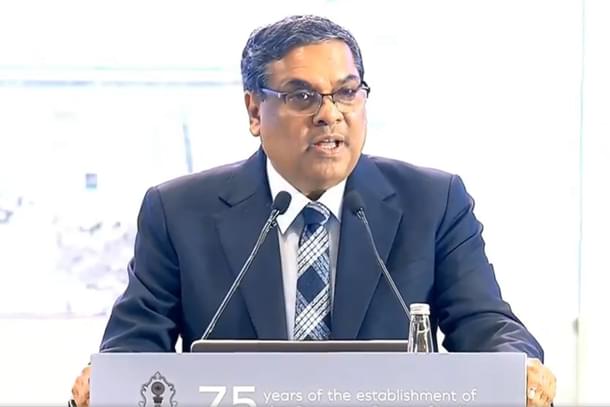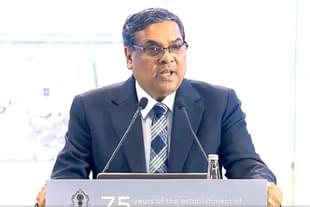News Brief
Who Is Sanjiv Khanna, Set To Become Next CJI As Chandrachud Recommends His Name To Law Ministry
Nishtha Anushree
Oct 17, 2024, 12:43 PM | Updated 12:43 PM IST
Save & read from anywhere!
Bookmark stories for easy access on any device or the Swarajya app.


Chief Justice of India D Y Chandrachud has officially recommended Justice Sanjiv Khanna, the second-most senior judge of the Supreme Court, as his successor in a letter to the Union Law Ministry.
Once approved by the government, Justice Khanna will become the 51st Chief Justice of India, serving a six-month term until his retirement on 13 May 2025.
CJI Chandrachud is set to retire on November 10, and in keeping with tradition, the government had written to him last week asking for the name of his successor.
A brief profile
Justice Khanna, who enrolled as a lawyer with the Bar Council of Delhi in 1983, began his career practicing at the district courts in Tis Hazari before moving on to the Delhi High Court and tribunals.
He served as Senior Standing Counsel for the Income Tax Department and was appointed Standing Counsel (Civil) for the National Capital Territory of Delhi in 2004, Indian Express reported.
Additionally, he handled several criminal cases as an Additional Public Prosecutor at the Delhi High Court. In 2005, Justice Khanna was elevated as an additional judge of the Delhi High Court and became a permanent judge the following year.
During his tenure at the Delhi High Court, he served as the Chairman/Judge-in-charge of the Delhi Judicial Academy, Delhi International Arbitration Centre, and the District Court Mediation Centres.
On 18 January 2019, Justice Khanna was elevated to the Supreme Court, one of the few judges to do so without having previously served as Chief Justice of a High Court.
He has held significant positions, including Chairman of the Supreme Court Legal Services Committee and Executive Chairman of the National Legal Services Authority.
He is also a member of the Governing Council of the National Judicial Academy, Bhopal. As a Supreme Court judge, Justice Khanna has played a crucial role in several landmark cases.
In one high-profile case, he was part of a bench that ruled on the limits of free speech, emphasizing that Article 19(1)(a) cannot be used to infringe upon the fundamental rights guaranteed by Article 21, particularly the right of others to listen or not to listen.
Justice Khanna has also contributed to significant rulings, including delivering a dissenting opinion in the case involving the Central Vista redevelopment project and being part of constitutional bench decisions such as those related to the abrogation of Article 370 and the 2018 electoral bonds scheme.
Nishtha Anushree is Senior Sub-editor at Swarajya. She tweets at @nishthaanushree.




